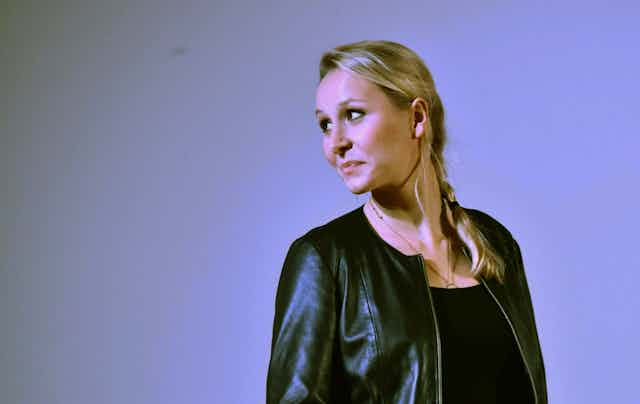According to some sources, the Front National (or whatever it is about to start calling itself) thinks it has a good chance in 111 of the 577 seats in the forthcoming parliamentary election in France (taking place on June 11 and 18).
But Marion Maréchal-Le Pen, niece of party leader Marine Le Pen and one of the party’s only two outgoing deputies, won’t be among the candidates. She has said that she will not stand for re-election in the south-eastern Vaucluse department for personal reasons. She also plans to step down as leader of the Front National group in the Provence-Alpes-Côtes d’Azur regional assembly.
Le Canard enchaîné first published rumours of this story in April. Maréchal-Le Pen has a two-year-old daughter with whom she wants to spend more time. The marriage to the father ended in a divorce last year, which she reportedly blames on her political career. But she decided to wait until the election was done and until after the first meeting of the party’s policy committee on Tuesday to formalise the announcement.
The daughter of Marine Le Pen’s elder sister Yann, Maréchal-Le Pen created something of a stir when she was elected to the National Assembly in June 2012. At the age of just 22, she was the youngest deputy ever. In fact, she had already appeared on a poster with her grandfather, Jean-Marie Le Pen, at the age of two. Her father was president of the Front National youth wing in the 1990s and she stood without success in local and regional elections in the Paris region in 2008 and 2010.
It wasn’t just her age that caused a sensation in 2012. Maréchal-Le Pen took the seat from a right-wing republican who had represented the constituency for 26 years. And although her aunt had scored well there in the 2012 presidential election (with 31% against her national score of 18%), the result was still a surprise.
Rapid rise
Maréchal-Le Pen’s photogenic qualities and willingness to take on the media appeared to make her the next in line for the family business – the poster girl for the Front National for years to come. There was talk of a cabinet post, perhaps the justice ministry, in the event of her aunt winning. Among the party’s ‘Marinesceptics’, she was seen as a vision of a ‘post-mariniste’ future.
Although she was never really a rival to her aunt, her success in winning a seat in parliament – while Marine Le Pen failed in her attempt to win in her adopted heartland in the north of France – certainly put their relationship on edge. Maréchal-Le Pen also remained closer, temperamentally and ideologically, to her grandfather in the conflict that led to the party’s founder being expelled from the party. He, for his part, called her announcement an act of “desertion”.
Maréchal-Le Pen was more economically liberal, socially conservative, and more concerned with the politics of identity than Marine Le Pen. She is said to have attended meetings of identitaires groups, which are committed to ideas of nativism and even white supremacy. However, she does not speak at these meetings, and only, she has always claimed, goes as an observer.
She also attended services among hardline Catholic groups and was frustrated by Marine Le Pen’s refusal to endorse the Manif’ pour Tous movement, a group formed to oppose the legalisation of same-sex marriage. But her presence helped to keep the Catholic far-right on side.
A party split
Maréchal-Le Pen’s political successes, as well as her espousal of the more “traditional” values of the Front National saw her described as the embodiment of “le FN du sud”, in contrast to the “FN du nord”, in its turn represented by Florian Philippot and his more “national proletarian” style. This geographical division within the party was not necessarily seen as a problem. The two wings of the party could actually appeal to and draw in different electorates, and the strategy seemed to work, given the undeniable success of the Front National in local, regional and European elections – and now in the presidential election itself.
Nevertheless, the ideological and personal differences between the two branches run deep. Maréchal-Le Pen and Philippot detest one another, and when his political line won out, she was indignant. The Le Pen election programme, with its insistence on a strong state, protectionism, and the appropriation of a number of other left-wing themes provoked profound concern within the party.

The conduct of the 2017 campaign, culminating in the television debate on May 3 was also a disappointment, as was the final result. Even before the final round of voting, Maréchal-Le Pen committed a faux pas when she seemed to admit the party had accepted defeat, but that 40% would be a great result for her aunt all the same. This was taken as confirmation that this is what the Le Pen camp expected as a minimum. In the end, she took just 33.9% of the vote.
If the restyled FN – perhaps the Patriotic and Republican Alliance – does poorly in the general election, Philippot could well be relegated. Marion Maréchal-Le Pen will only be able to enjoy that from the sidelines. But don’t bet against a comeback somewhere down the line. Marine Le Pen once swore she would never take up politics as a career, and look what happened. Her niece is still young, and the Le Pens are nothing if not resilient. “Ce n'est qu'un au revoir” – it’s a goodbye, for now, but not farewell.

